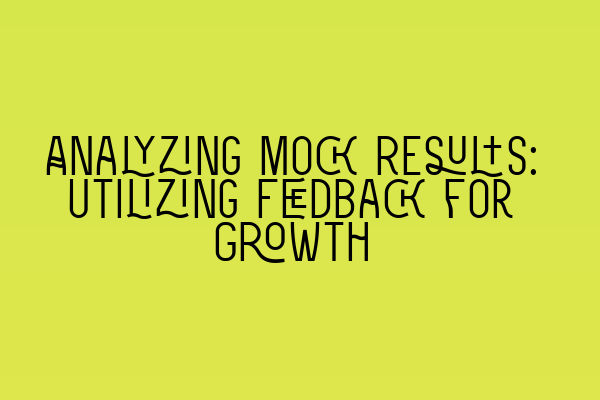Analyzing Mock Results: Utilizing Feedback for Growth
When it comes to preparing for the SQE exam, undergoing mock tests is an essential step to gauge your understanding of the material and identify areas that require improvement. Mock tests not only provide a realistic simulation of the actual exam but also offer valuable feedback that can be used to enhance your knowledge and performance. In this article, we will dive into the importance of analyzing mock results and discuss how you can utilize feedback for growth.
Why Analyzing Mock Results Matters
Mock tests serve as a benchmark for your progress and highlight the strengths and weaknesses in your knowledge base. Analyzing the results of these tests allows you to:
- Identify knowledge gaps: Mock tests help in identifying areas of the SQE syllabus where you might be lacking sufficient understanding. By reviewing your results, you can pinpoint specific topics or concepts that require further exploration.
- Focus on weak areas: Once you identify your knowledge gaps, you can concentrate your efforts on studying those specific areas. This focused approach can help you save time and energy by prioritizing the topics that need the most attention.
- Develop exam strategies: Analyzing mock results also helps you understand the types of questions you struggle with the most. This insight allows you to develop effective exam strategies to improve your performance, such as time management techniques, question prioritization, and exam-day stress reduction tactics.
Now that we understand the significance of analyzing mock results, let’s explore how you can effectively utilize the feedback provided.
Utilizing Feedback for Growth
1. Review each question and answer: Take the time to review each question and answer choice in your mock test. Compare your chosen answer with the correct answer and understand the rationale behind it. This analysis will help you identify errors in your reasoning and build a stronger foundation of knowledge.
2. Identify recurring patterns: Look for recurring patterns in the questions you answered incorrectly. Are there specific topics or concepts that you consistently struggle with? Make note of these patterns and prioritize them in your study plan. Consider seeking additional resources or guidance to improve your understanding in these areas.
3. Seek clarification: If you encounter questions or concepts that you find particularly challenging, don’t hesitate to seek clarification. Reach out to mentors, tutors, or fellow students to gain further insights and strengthen your understanding. Additional resources such as related articles, workshops, or interactive SQE mock tests can also provide valuable support in bridging your knowledge gaps:
- Legal Considerations in Residential Leases: Essential Insights for Solicitors
- Lease Laws in the UK: Unraveling the Legal Framework for Tenants
- Workshops on Land Law: Hands-On Training for Effective Practice
- Differences Between Commercial and Residential Property Laws: Examining Contrasting Regulations
- Interactive SQE Mock Tests for Property: Enhance Your Exam Performance
4. Adapt your study plan: Based on the feedback from your mock test analysis, adapt your study plan accordingly. Allocate more time to the topics you struggle with the most, and revise the areas where you performed well to maintain your understanding.
5. Repeat the process: Mock tests are not a one-time activity. Regularly schedule and undertake mock tests to track your progress over time. Repeating the process of analyzing your mock results allows you to measure your growth and identify any remaining weaknesses as you approach the exam date.
Conclusion
Analyzing mock results is a crucial step in your preparation journey for the SQE exam. By identifying knowledge gaps, focusing on weak areas, and developing effective exam strategies, you can optimize your study efforts and improve your overall performance. Remember to utilize the feedback provided by mock tests and seek additional resources or guidance as needed. Stay dedicated, adapt your study plan, and keep repeating the process to ensure consistent growth and success.

Leave a Reply